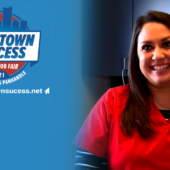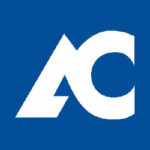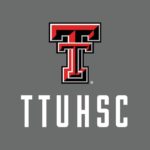- Education, Training, and Library Occupations
- Entertainment and Sports Occupations
- Featured Occupations
- Healthcare Occupations
Coach
Phillip | September 27, 2018
1251 Views
0 Likes
0
Ratings
Related
- Education, Training, and Library Occupations
- Entertainment and Sports Occupations
- Featured Occupations
- Healthcare Occupations
Coach
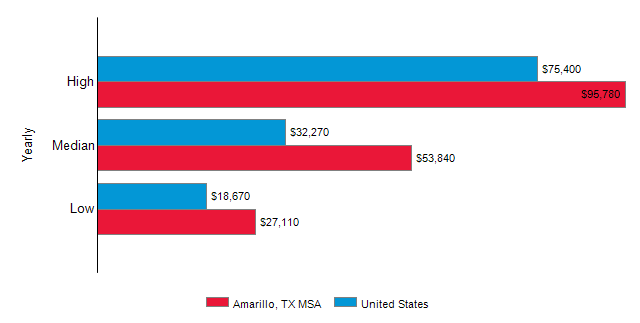
| Quick Facts: Coaches and Scouts | |
|---|---|
| (Amarillo MSA) 2017 Median Pay | $53,840 per year |
| Typical Entry-Level Education | Bachelor's degree |
| Work Experience in a Related Occupation | None |
| On-the-job Training | None |
| (US) Number of Jobs, 2016 | 276,100 |
| (US) Job Outlook, 2016-26 | 13% (Faster than average) |
| (US) Employment Change, 2016-26 | 35,700 |
What Coaches and Scouts Do
Coaches teach amateur or professional athletes the skills they need to succeed at their sport. Scouts look for new players and evaluate their skills and likelihood for success at the college, amateur, or professional level. Many coaches also are involved in scouting.
Work Environment
Coaches and scouts often work irregular hours, including evenings, weekends, and holidays. Full-time coaches usually work more than 40 hours a week for several months during the sports season. Coaches travel frequently to sporting events. Scouts may be required to travel more extensively when searching for talented athletes.
How to Become a Coach or Scout
Coaches and scouts typically need a bachelor’s degree. They also must have extensive knowledge of the game. Coaches typically gain this knowledge through their own experiences playing the sport at some level. Although previous playing experience may be beneficial, it is typically not required for most scouting jobs.
Pay
The median annual wage for coaches and scouts was $32,270 in May 2017.
Job Outlook
Employment of coaches and scouts is projected to grow 13 percent from 2016 to 2026, faster than the average for all occupations. Increasing participation in high school and college sports may boost demand for coaches and scouts.

Duties
Coaches typically do the following:
- Plan, organize, and conduct practice sessions
- Analyze the strengths and weaknesses of individual athletes and opposing teams
- Plan strategies and choose team members for each game
- Provide direction, encouragement, and motivation to prepare athletes for games
- Call plays and make decisions about strategy and player substitutions during games
- Plan and direct physical conditioning programs that enable athletes to achieve maximum performance
- Instruct athletes on proper techniques, game strategies, sportsmanship, and the rules of the sport
- Keep records of athletes’ and opponents’ performances
- Identify and recruit potential athletes
- Arrange for and offer incentives to prospective players
Coaches teach professional and amateur athletes the fundamental skills of individual and team sports. They hold training and practice sessions to improve the athletes’ form, technique, skills, and stamina. Along with refining athletes’ individual skills, coaches are responsible for instilling in their players the importance of good sportsmanship, a competitive spirit, and teamwork.
Many coaches evaluate their opponents to determine game strategies and to establish particular plays to practice. During competition, coaches call specific plays intended to surprise or overpower the opponent, and they may substitute players to achieve optimum team chemistry and success.
Many high school coaches are primarily academic teachers or other school administrators who supplement their income by coaching part time.
Coaches may assign specific drills and correct athletes’ techniques. They may also spend their time working one-on-one with athletes, designing customized training programs for each individual. Coaches may specialize in teaching the skills of an individual sport, such as tennis, golf, or ice skating. Some coaches, such as baseball coaches, may teach individual athletes involved in team sports.
Scouts typically do the following:
- Read newspapers and other news sources to find athletes to consider
- Attend games, view videotapes of the athletes’ performances, and study statistics about the athletes to determine their talent and potential
- Talk to the athlete and the coaches to see if the athlete has what it takes to succeed
- Report to the coach, manager, or owner of the team for which he or she is scouting
- Arrange for and offer incentives to prospective players
Scouts evaluate the skills of both amateur and professional athletes. Scouts seek out top athletic candidates for colleges or professional teams and evaluate their likelihood of success at a higher competitive level.

Coaches and scouts held about 276,100 jobs in 2016. The largest employers of coaches and scouts were as follows:
| Elementary and secondary schools; state, local, and private | 21% |
| Arts, entertainment, and recreation | 21 |
| Colleges, universities, and professional schools; state, local, and private | 19 |
| Self-employed workers | 10 |
Some scouts work for organizations that deal directly with high school athletes. These scouts collect information on the athlete and help sell his or her talents to potential colleges.
At the college level, scouts typically work for scouting organizations or are self-employed. In either case, they help colleges recruit the best high school athletes.
Scouts who work at the professional level are typically employed by the team or organization directly.
Those people who coach and scout for outdoor sports may be exposed to all weather conditions of the season. In addition, they must travel often to attend sporting events. This is particularly true for those in professional sports.
Work Schedules
Work hours can vary for coaches and scouts and may include evenings, weekends, and holidays. Professional or college coaches may work additional hours during the sport’s season.

Education
College and professional coaches usually must have a bachelor’s degree, typically in any subject. However, some coaches may decide to study exercise and sports science, physiology, kinesiology, nutrition and fitness, physical education, or sports medicine.
High schools typically hire teachers or administrators at the school for most coaching jobs. If no suitable teacher is found, schools hire a qualified candidate from outside the school. For more information on education requirements for teachers, see the profile on high school teachers.
Like coaches, scouts must typically have a bachelor’s degree. Some scouts decide to get a degree in business, marketing, sales, or sports management.
Other Experience
College and professional coaching jobs typically require experience playing the sport at some level.
Scouting jobs typically do not require experience playing a sport at the college or professional level, but doing so can be beneficial. Employers look for applicants with a passion for sports and an ability to spot young players who have exceptional athletic ability and skills.
Licenses, Certifications, and Registrations
Most state high school athletic associations require coaches to be certified or at least complete mandatory education courses.
Certification often requires coaches to be a minimum age (at least 18 years old) and be trained in cardiopulmonary resuscitation (CPR) and first aid. Some states also require coaches to attend classes related to sports safety and coaching fundamentals prior to becoming certified. For information about specific state coaching requirements, contact the state’s high school athletic association or visit the National Association of State Boards of Education.
Although most public high school coaches need to meet these state requirements in order to become a coach, certification may not be required for coaching jobs in private schools.
Some schools may require coaches to have a teaching license and complete a background check.
Certification requirements for college coaching positions also vary.
Additional certification may be highly desirable or even required for someone to coach individual sports such as tennis or golf. There are many certifying organizations specific to the various sports, and their requirements vary.
Part-time workers and those in smaller facilities or youth leagues are less likely to need formal education or training and may not need certification.
Advancement
To reach the rank of a professional coach, a candidate usually needs years of coaching experience and a winning record at a college. Some coaches may not have previous coaching experience but are nevertheless hired at the professional level because of their success as an athlete in their sport.
Some college coaches begin their careers as graduate assistants or assistant coaches in order to gain the knowledge and experience needed to become a head coach. Large schools and colleges that compete at the highest levels require a head coach who has had substantial experience at another school or as an assistant coach.
Other college coaches may start out as high school coaches before moving up to the collegiate level.
Scouts may begin working as talent spotters in a particular area or region. They typically advance to become supervising scouts responsible for a whole territory or region.
Important Qualities
Communication skills. Because coaches instruct, organize, and motivate athletes, they must have excellent communication skills. They must communicate proper techniques, strategies, and rules of the sport effectively enough that every player on the team understands what he or she has been told.
Decision making skills. Coaches must choose the appropriate players to use at a given position at a given time during a game and must know the proper time to utilize game-managing tools such as timeouts. Coaches and scouts must also be very selective when recruiting players.
Dedication. Coaches must attend daily practices and assist their team and individual athletes in improving their skills and physical conditioning. Coaches must be dedicated to their sport, as it often takes years to become successful.
Interpersonal skills. Being able to relate to athletes helps coaches and scouts foster positive relationships with their current players and recruit potential players.
Leadership skills. Coaches must demonstrate good leadership skills to get the most out of athletes. They must be able to motivate, develop, and direct young athletes.
Resourcefulness. Coaches must find and develop a game plan and strategy that yields the best chances for winning. Coaches often need to create original plays or formations that provide a competitive advantage and confuse opponents.
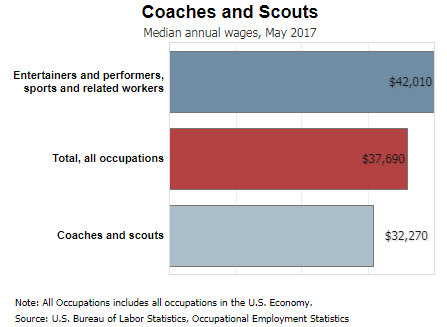
The median annual wage for coaches and scouts was $32,270 in May 2017. The median wage is the wage at which half the workers in an occupation earned more than that amount and half earned less. The lowest 10 percent earned less than $18,670, and the highest 10 percent earned more than $75,400.
In May 2017, the median annual wages for coaches and scouts in the top industries in which they worked were as follows:
| Colleges, universities, and professional schools; state, local, and private | $44,340 |
| Arts, entertainment, and recreation | 35,480 |
| Elementary and secondary schools; state, local, and private | 26,880 |
Coaches and scouts often work irregular hours, including evenings, weekends, and holidays. Professional or college coaches usually work more than 40 hours a week for several months during the sport’s season, if not most of the year. Many high school coaches work part time and may have other jobs aside from coaching.

Employment of coaches and scouts is projected to grow 13 percent from 2016 to 2026, faster than the average for all occupations. Rising participation in high school and college sports should increase demand for coaches and scouts.
High school enrollment is projected to increase over the next decade, resulting in a rise in the number of student athletes. As schools offer more athletic programs and as more students participate in sports, the demand for coaches may increase.
Participation in college sports also is projected to increase over the next decade, particularly at smaller colleges and in women’s sports. Many small, Division III colleges are expanding their sports programs and adding new teams as a way to help promote the school and recruit potential students. However, new rules allowing an increase in scholarship payments to student athletes may result in funding cuts to smaller collegiate sports programs and the accompanying coaching staffs.
The growing interest in college and professional sports also will increase demand for scouts. Colleges must attract the best athletes to remain competitive. Successful teams help colleges enhance their reputation, recruit future students, and raise donations from alumni. Colleges, therefore, will increasingly rely on scouts to recruit the best possible high school athletes. In addition, as college tuition increases and scholarships become more competitive, high school athletes will hire scouts directly, in an effort to increase the athletes’ chances of receiving a college scholarship.
However, funding for athletic programs at schools often is cut first when budgets become tight. For example, some high schools within the same school district may combine their sports programs in an effort to cut costs. Still, the popularity of team sports often enables shortfalls to be offset with help from fundraisers, booster clubs, and parents.
Job Prospects
Strong competition is expected for higher paying jobs at the college level, and competition will be even greater for jobs in professional sports.
Job prospects at the high school level should be good, but coaching jobs typically go to those teaching in the school. Candidates who have a degree or are state certified to teach academic subjects, therefore, should have the best prospects for getting coaching jobs at high schools. The need to replace the number of high school coaches who change occupations or leave the labor force also will provide some jobs.
Coaches in girls’ and women’s sports may have better job opportunities because of a growing number of participants and leagues.
Competition is also likely to be strong for jobs as scouts, particularly for professional teams.
| Employment projections data for coaches and scouts, 2016-26 | |||||
| Occupational Title | SOC Code | Employment, 2016 | Projected Employment, 2026 | Change, 2016-26 | |
| Percent | Numeric | ||||
| Coaches and scouts | 27-2022 | 276,100 | 311,700 | 13 | 35,700 |
| SOURCE: U.S. Bureau of Labor Statistics, Employment Projections program | |||||
Area Universities/Colleges/Training Providers
Bureau of Labor Statistics, U.S. Department of Labor, Occupational Outlook Handbook, Coaches and Scouts, on the Internet at https://www.bls.gov/ooh/entertainment-and-sports/coaches-and-scouts.htm (visited September 03, 2018).
Salary information comes from the Bureau of Labor Statistics, Occupational Employment Statistics Program, a semi-annual survey that provides wage and employment statistics for the nation, each state, and sub-state regions.
Tagged as Ascension Academy, Athletics, Austin Johnson, Austin Johnson Academy of Hoops, Basketball, Coach, Education, Entertainment, Healthcare, Hoops, Palo Duro, Sports, Training, University of Oklahoma.
Written by Phillip



